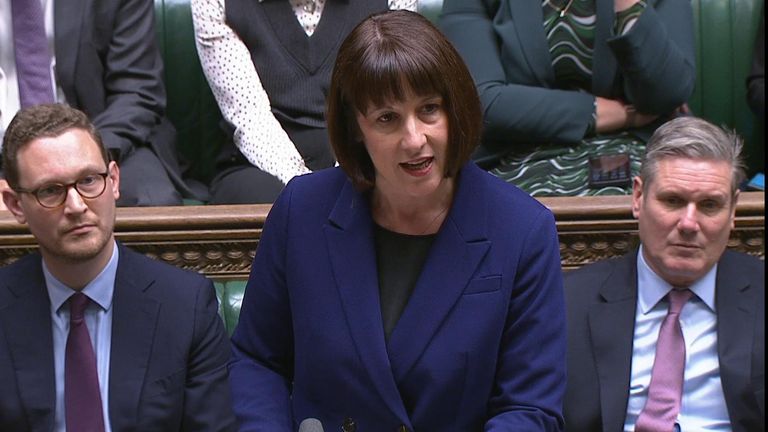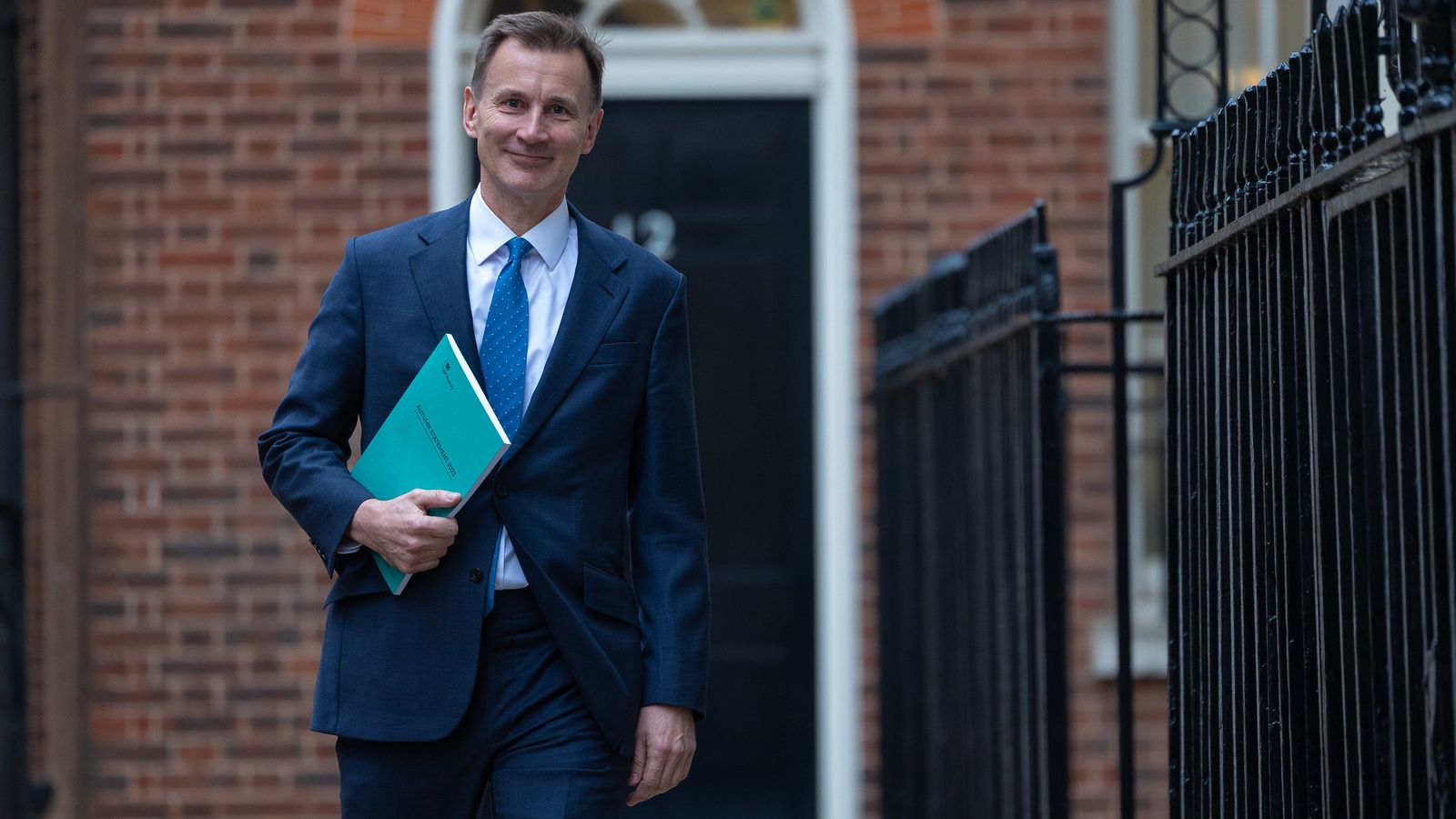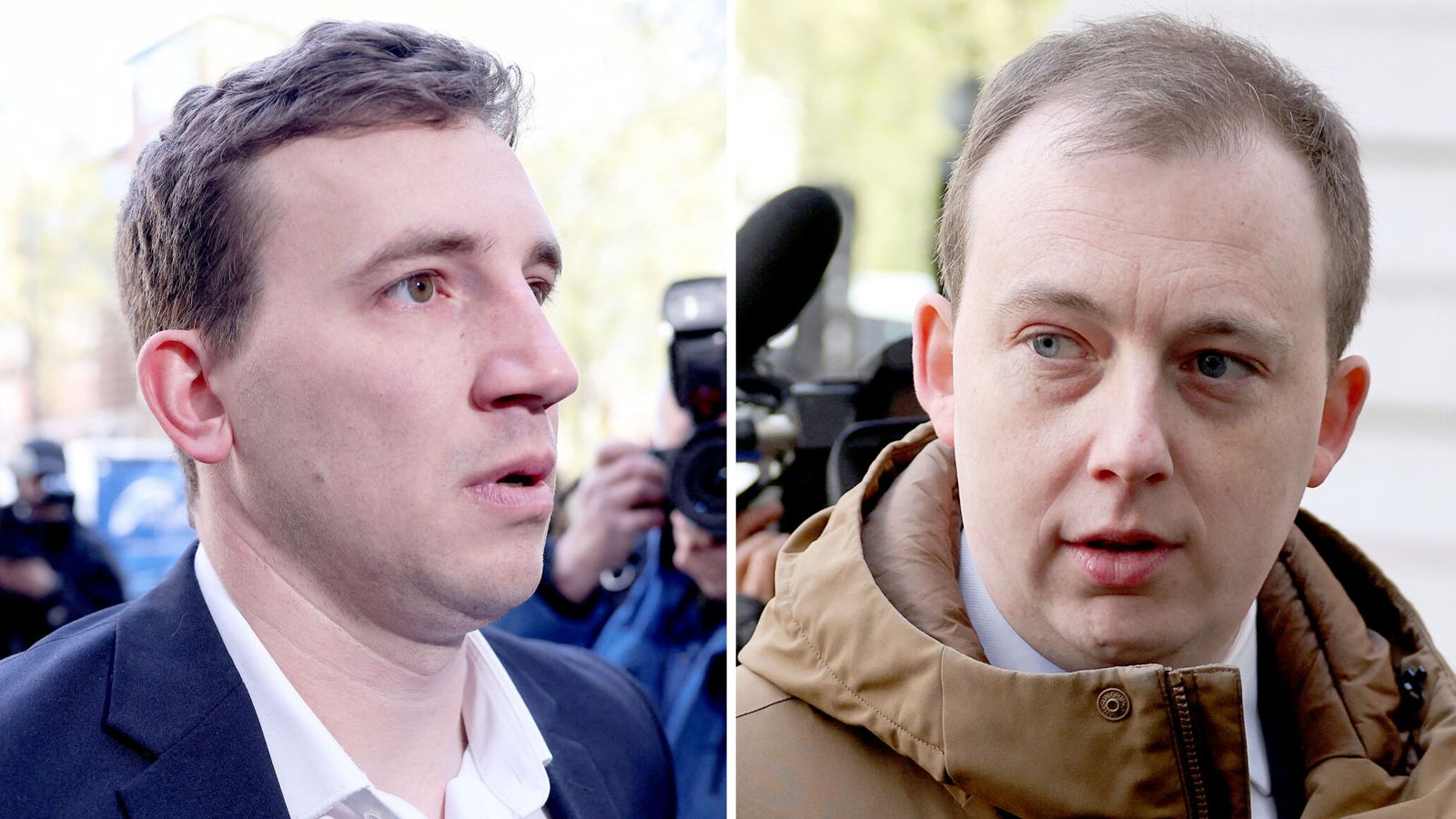
National insurance is to be cut by two percentage points, the chancellor has announced.
In a boost to employees’ pay packets, Jeremy Hunt told the Commons that the main 12% national insurance rate would fall to 10% from 6 January – saving those on an average salary of £35,000 over £450 a year.
In his autumn statement, he also abolished NI payments for the self-employed, known as class two national insurance, to recognise the government “values their work”.
Politics latest: Chancellor delivers autumn statement amid pressure in the polls
The tax cuts follow long-standing pressure from the Tory backbenches to reduce the burden on both the public and business, which has been sat at a 70-year high.
But it also comes as a general election looms, with the Conservatives still lagging behind Labour in the polls.
Delivering his autumn statement in the Commons, the chancellor said: “If we want people to get up early in the morning, if we want people to work nights, if we want an economy where people go the extra mile and work hard then we need to recognise that their hard work benefits all of us.”
However, Sky News’ economics editor Ed Conway said the overall tax burden on the public would still remain at a record high as the government continued its freeze on tax thresholds.
Read more:
Key announcements from chancellor at a glance
Forecasts from the Office for Budget Responsibility (OBR) showed taxes were still trending upwards, with a post-war high of 37.7% set to be reached by 2028/29 under the current government plans.
They put this down to so-called “fiscal drag”, as while people’s wages may increase, the level at which they start paying tax remains unchanged, and that leads to more people being moved into the higher tax rates – four million more, if the OBR’s prediction is correct.
Labour’s shadow chancellor, Rachel Reeves, said working people would still be “worse off” following Mr Hunt’s announcements, adding: “From their failure to uprate income tax or national insurance bands, to forcing councils to raise council tax, the Conservatives have pushed the costs of their failure onto others.
“But the British people won’t be taken for fools. They know that what has been announced today owes more to the cynicism of a party desperate to cling on to power than the real priorities of this high-tax, low-growth Conservative government.
“So I think we can forgive taxpayers for not celebrating when they see the truth behind today’s announcements.”
Leader of the Liberal Democrats, Sir Ed Davey, also called it a “Hunt hoax”, adding: “The British people will rightly be furious at this deception, as they are forced to pay the price for Conservative chaos through years of unfair tax hikes.”
Elsewhere in his speech, Mr Hunt confirmed Universal Credit would be increased by inflation next April in line with September’s inflation figure of 6.7% – an average increase of £470 for 5.5 million households – despite rumours the government was planning a smaller rise.
And he said the full state pension would go up by 8.5% to £220 per week – worth up to £900 more a year, honouring the Tories’ commitment to the triple lock.
But the chancellor also announced new tougher measures for job seekers, saying those who fail to find work after 18 months of “intensive support” will be given mandatory work placements.
Those who do not engage with the process for six months will lose their benefits altogether.
Mr Hunt also confirmed the much-trailed plans to reform the benefits process for those who are signed off work because of sickness or disability.
He called the over 100,000 people signed off each year a “waste of potential” that was “wrong economically and wrong morally”.
As a result, the chancellor said the government would reform the Work Capability Assessment to “reflect greater flexibility and availability of home working after the pandemic”.
Mr Hunt said: “Our choice is not big government, high spending and high tax because we know that leads to less growth, not more.
“Instead we reduce debt, cut taxes and reward work. We deliver world-class education. We build domestic sustainable energy and we back British business”.
He added: “Conservatives say we should unlock the potential we have right here at home, which we do with the biggest set of welfare reforms in a decade.”
Other announcements in the autumn statement included:
• Freezing all alcohol duty until 1 August 2024
• Extend 75% business rates discount for retail, hospitality and leisure businesses for another year
• Increasing the local housing allowance rate, giving 1.6 million households an average of £800 of support next year
• Consult on giving savers a legal right to have one pension pot for life that employers pay into
• Make the super deduction tax break for large businesses investing in the UK permanent
The chancellor insisted the government’s plan for the British economy was “working” as ministers had “taken difficult decisions to put our economy back on track”.
He celebrated a reduction in government borrowing and the halving of inflation since last autumn’s record high after Liz Truss’s disastrous mini-budget, saying that gave him the room to make tax cuts.
However, inflation still sits at 4.6% – double the target of the Bank of England.
Labour’s Ms Reeves said: “The chancellor claims the economy has ‘turned a corner’, yet the truth is that under the Conservatives growth has hit a dead end.
“What has been laid bare today is the full scale of the damage that this government has done to our economy over 13 years, and nothing that has been announced today will remotely compensate.”
She added: “As the sun begins to set on this divided, out of touch, weak government, the only conclusion the British people will reach is this – after 13 years of the Conservatives, the economy simply isn’t working.
“And, despite all the promises today, working people are still worse off.”
The SNP’s Drew Hendry also said the measures were “far too little, too late for the squeezed majority of households”, calling the speech “a con trick from a Tory government that crashed the economy”.
The OBR has upgraded its growth forecast for gross domestic product or GDP – a measure of the size of the economy – this year, but downgraded the figure for subsequent years.
The budget watchdog’s forecast in March was for the economy to shrink by 0.2% in 2023, but that has now been revised up to 0.6%.
However, come 2024, growth is forecast to be 0.7% rather than the 1.8% expected at the time of the budget, 2025 is expected to see 1.4% rather than 2.5% and 2026 could be 1.9% instead of 2.1%.
Growth is then expected to go beyond the previous forecast, with 2% in 2027, slightly above the 1.9% predicted in March, with 1.7% in 2028.
“If we want those numbers to be higher, we need higher productivity,” the chancellor said.













